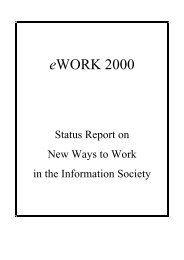Proceedings of 8th European Assembly on telework (Telework2001)
Proceedings of 8th European Assembly on telework (Telework2001)
Proceedings of 8th European Assembly on telework (Telework2001)
You also want an ePaper? Increase the reach of your titles
YUMPU automatically turns print PDFs into web optimized ePapers that Google loves.
162(b) The virtual labour markets that are beginning to develop do not, however, resemble spotmarkets, but rather a complex network <str<strong>on</strong>g>of</str<strong>on</strong>g> relati<strong>on</strong>ships between workers who market their servicesthrough the channels <str<strong>on</strong>g>of</str<strong>on</strong>g> pers<strong>on</strong>al and instituti<strong>on</strong>alised c<strong>on</strong>tact networks, but seldom <strong>on</strong> openplatforms such as freelance exchanges.(c) Open-market coordinati<strong>on</strong> puts great demands <strong>on</strong> the ability <str<strong>on</strong>g>of</str<strong>on</strong>g> freelancers to market theirservices. The capability to build trust relati<strong>on</strong>ships with potential clients is crucial as trust isessential to create the willingness to take the risk <str<strong>on</strong>g>of</str<strong>on</strong>g> starting a collaborati<strong>on</strong>. This risk is perceivedas being especially high in the trade <str<strong>on</strong>g>of</str<strong>on</strong>g> services where the end product cannot be completelyspecified in advance and when value is not easily measured. For this reas<strong>on</strong>, l<strong>on</strong>g-term relati<strong>on</strong>shipsto clients and collaborators are sought. Temporary relati<strong>on</strong>ships/networks are mostly c<strong>on</strong>fined tomarginal activities.(d) Available technologies such as those <str<strong>on</strong>g>of</str<strong>on</strong>g>fered by <strong>on</strong>line work exchanges are not yet beingc<strong>on</strong>sidered sufficient to support trust-building. Substantial efforts <strong>on</strong> the part <str<strong>on</strong>g>of</str<strong>on</strong>g> website operatorsare necessary to improve the performance <str<strong>on</strong>g>of</str<strong>on</strong>g> work exchanges in this regard.To find out whether these opini<strong>on</strong>s voiced by (potential) users accurately reflect the quality <str<strong>on</strong>g>of</str<strong>on</strong>g> theservices <str<strong>on</strong>g>of</str<strong>on</strong>g>fered, we decided to analyse existent <strong>on</strong>line work exchanges in depth. In particular, wewere interested in whether <strong>on</strong>line work exchanges can act, through their functi<strong>on</strong> as virtual labourmarketplaces, as the backb<strong>on</strong>e <str<strong>on</strong>g>of</str<strong>on</strong>g> the development <str<strong>on</strong>g>of</str<strong>on</strong>g> an eLancing ec<strong>on</strong>omy.3 Matching Supply and Demand for Labour <strong>on</strong> the InternetUsing a rati<strong>on</strong>al, ec<strong>on</strong>omic logic based <strong>on</strong> transacti<strong>on</strong> cost and job search theory it can be shownthat a growing use <str<strong>on</strong>g>of</str<strong>on</strong>g> the Internet can lead to an increase in the efficiency <str<strong>on</strong>g>of</str<strong>on</strong>g> the matchingprocess <strong>on</strong> labour markets. A better match between worker and employer requirements andcapabilities may lead to faster ‘job-clearing’ <strong>on</strong> the labour market and thereby to lower fricti<strong>on</strong>alunemployment rates, more freedom from time and space c<strong>on</strong>straints traditi<strong>on</strong>ally affecting labourmarket participants, and less costly recruitment. Efficiency gains in this area might also result in ahigher share <str<strong>on</strong>g>of</str<strong>on</strong>g> worker/employer-transacti<strong>on</strong>s being executed <strong>on</strong> the open market instead <str<strong>on</strong>g>of</str<strong>on</strong>g> inside<str<strong>on</strong>g>of</str<strong>on</strong>g> permanent employment relati<strong>on</strong>ships.Work exchanges <strong>on</strong> the Internet are indeed beginning to play a major role as intermediaries in thelabour market by <str<strong>on</strong>g>of</str<strong>on</strong>g>fering innovative and/or high-performance services to recruiters as well as jobseekers.Through our research, which included a website c<strong>on</strong>tent analysis <str<strong>on</strong>g>of</str<strong>on</strong>g> all work exchanges infour <str<strong>on</strong>g>European</str<strong>on</strong>g> countries (Germany, the U.K., Austria and Switzerland), we explored in what waysthe services <str<strong>on</strong>g>of</str<strong>on</strong>g> these specialised sites differ from traditi<strong>on</strong>al intermediaries in the labour market andto what extent the different segments <str<strong>on</strong>g>of</str<strong>on</strong>g> the labour market transacti<strong>on</strong> process are supported. Wefound that the number <str<strong>on</strong>g>of</str<strong>on</strong>g> job listings in <strong>on</strong>line work exchanges is already very high (see Table 1)and that essential turnover is generated by private-sector job site operators (Le<strong>on</strong>ard 2000).








